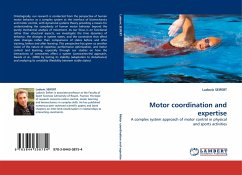
Shaping Decision-Making Behavior in Futsal
Perceiving the Dynamic Patterns of Interpersonal Coordination
Versandkostenfrei!
Versandfertig in 6-10 Tagen
39,99 €
inkl. MwSt.

PAYBACK Punkte
20 °P sammeln!
The main focus of our investigation was to capture the emergent patterns of coordination tendencies that allow a better understanding of how information support decisions and actions on team sports performance. Grounded on an ecological dynamics approach it is suggested that tactical behaviors in futsal should be seen at the level of the interactions between the individual and the environment.In four empirical studies it was observed that the continuous changes in velocity of each performer reflected an attempt to adapt their behaviors to environmental constraints, especially the ball dynamics...
The main focus of our investigation was to capture the emergent patterns of coordination tendencies that allow a better understanding of how information support decisions and actions on team sports performance. Grounded on an ecological dynamics approach it is suggested that tactical behaviors in futsal should be seen at the level of the interactions between the individual and the environment.In four empirical studies it was observed that the continuous changes in velocity of each performer reflected an attempt to adapt their behaviors to environmental constraints, especially the ball dynamics, the position of the goal, and also the time to ball interception. Practical implications for the desgin of practice tasks in futsal were also discussed.














